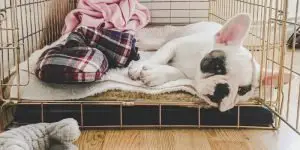
Surviving your puppy's first night - What to expect
- Written by Joshua Gordon
- Last updated
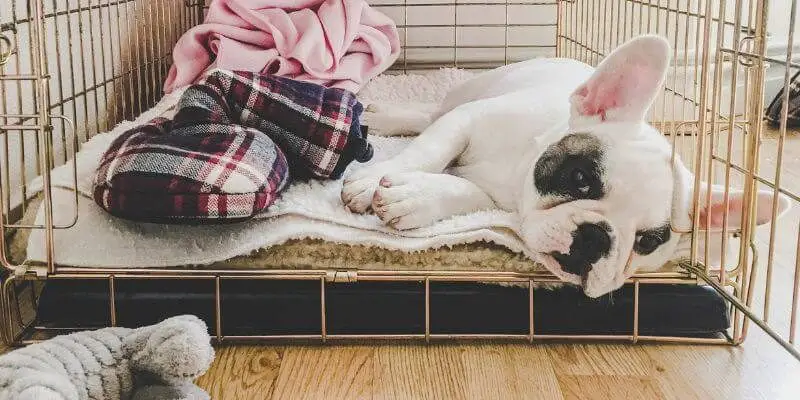
What to expect from your puppy’s first night – Key takeaways
- The first few nights will likely be the most difficult. A new environment will be scary and stressful for your pup, especially as they don’t have their mother for comfort. Expect your puppy to cry for the first few nights.
- Have your puppy’s sleeping area set up before they arrive. Plan where your puppy will be sleeping, ideally somewhere close to your own bedroom for the first few nights.
- Use a puppy crate. A crate is a safe, comfortable area that also makes housetraining easier in the long run.
- Ask your breeder for a blanket that smells like their mother. Having smells of your puppy’s mother can be reassuring and help them sleep better at night.
- Your puppy may have accidents during the night. Puppies between 8-12 weeks can only hold their bladder for a few hours at a time.
- Resist letting your puppy sleep in the bed. Always put the safety of your pup first and avoid any potential accidents. Your puppy will not likely be potty trained either.
- Check your puppy is safe but avoid attention-seeking behavior. If your puppy cries during the night check they are safe and don’t need the bathroom. Try to avoid teaching your puppy that if they cry you will come.
In this article
What to expect on your puppy’s first night home
Your puppy’s first night with you will likely be the most difficult, both for you and your pooch. Being in a strange environment with unfamiliar people will be very scary and stressful for your pup, especially as they don’t have their mother and littermates for comfort.
Set up your puppy’s sleeping quarters before you bring them home
Provide somewhere safe for your puppy to retreat to if they feel a bit overwhelmed. Make sure the area is warm, dry, and in a quiet spot, such as in a spare room.
When you put your puppy to bed, it’s likely that they will cry – a lot
This is completely normal as your puppy will be missing their old family. You might want to sleep in the same room with your puppy for the first few nights so they know that they’re not alone.
Check-in and reassure your puppy but try to avoid creating attention-seeking behaviours
If your puppy whimpers and shows no signs of stopping, it’s okay to reassure them and offer attention, at least for the first few nights until they have settled into their new home. Some breeders may give you something that smells of your puppy’s mother, which can be helpful for comforting your pup during the night.
Prepare for bathroom breaks and accidents during the night
Young puppies will not have full control of their bladders just yet, particularly before the age of 12 weeks, so you’ll need to set a couple of early morning alarms to let your puppy outside. You should also place some training pads around your puppy’s bed to prepare for any accidents.
After taking your puppy to use the bathroom, take them back to bed straight away with minimal fuss to help them understand that nighttime is for sleeping, not playing.
Don’t be tempted to let you puppy sleep in your bed at first
Although it’s tempting to let your puppy sleep in your bed, it’s best to let them sleep in a crate on the floor. Letting your puppy sleep in your bed can put your puppy in danger of falling out or being smothered. Puppies with full reign of the house are likely to get into mischief and have accidents, which you definitely don’t want to wake up to in the morning!
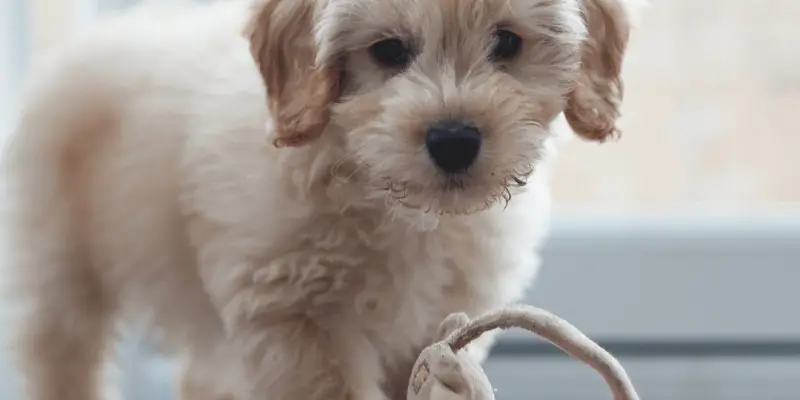
How long until a puppy can sleep through the night?
Most puppies don’t begin sleeping through the night until they are around 16 weeks of age, though, with training and patience, your pup may be able to get to this stage earlier. Bear in mind that puppies don’t tend to be fully housebroken until 6 months old, so you will still need to let your puppy outside a couple of times a night to use the bathroom.
As a rule, puppies can hold their bladder for 1 hour for every month of age. So, for example, an 8-week-old puppy can go around 2 hours without needing to potty

Where should your puppy sleep?
Puppies will sleep just about anywhere, but it’s best to set up a suitable sleeping area for your pooch as this will help them view the space as somewhere cozy and safe to nap.
Besides, you probably don’t want to find your puppy using your favorite sweater as a bed, especially if they shed!
Puppy crate
The best place for a puppy to sleep is inside a dog crate. Not only does a crate make housetraining your puppy considerably easier, but it also provides your pup with a secluded space they can unwind.
When your puppy is stressed or anxious, they will naturally gravitate toward their crate. In the wild, canines live in dens, so it’s normal for domesticated dogs to want to rest somewhere warm, quiet, and secure.
In addition, a crate allows you to put your puppy somewhere safe where they can’t get into trouble when you’re busy or out of the house.
Make their crate comfortable
Before you go ahead and crate train your puppy, you’ll first need to make the area inviting and comfortable. Fill it with blankets or a dog bed, as well as some toys and treats. Place a blanket over the exterior of the crate to make it feel more den-like and secure.
You essentially want to persuade your puppy to check out the new object and make it look like somewhere they’d want to spend time.
Encourage a positive association with the crate
Making your puppy’s crate cozy and snug isn’t enough, as you’ll need to build up your puppy’s confidence around the crate. Encouraging a positive association with the object is key as, otherwise, your puppy will be naturally fearful and wary of it.
This can be done by praising and rewarding your pup for simply investigating the crate. If your puppy sniffs the new object, lavish them with attention and let them know they’re being a good dog!
Once your puppy is comfortable being around the crate, they might be brave enough to go inside it, especially if there are some exciting toys or treats that await them.
Start closing the door on the crate while your puppy is inside for a short period, making sure to reward them afterward. You can gradually increase the duration until your puppy is happy being in the crate for at least 10 minutes with the door closed.
Now you can begin leaving the room while your puppy is inside the crate alone. Only leave for a minute or two, then slowly increase the time you are away until your puppy is fine being by themselves for at least an hour.
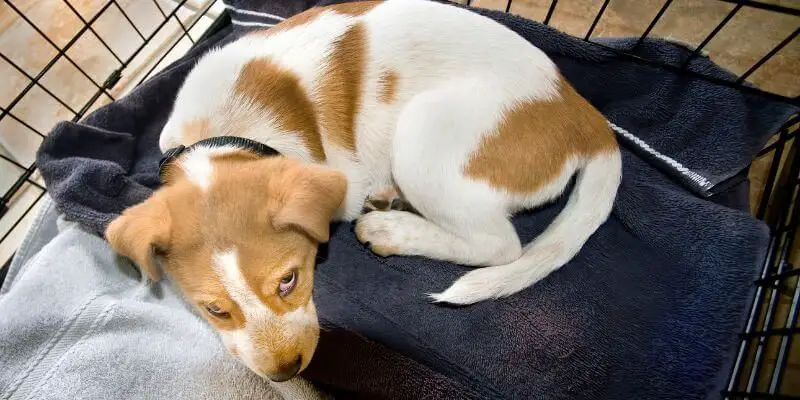
Create a nighttime puppy schedule
Alongside crate training your puppy, creating a nighttime schedule is another great way you can help them sleep at night. Dogs thrive on routine as it lets them know what to expect each day.
Your puppy’s nighttime schedule should be dedicated to relaxing to encourage your pooch to unwind before bed. In other words, don’t rile your puppy up with a game of tug of war right before you settle them in for the night!
Establish a bedtime routine
Establishing a bedtime routine for your puppy will help them understand when it’s time to sleep, especially if you repeat the actions consistently. Dogs are smart animals, even at a young age, so if you keep to a schedule, they’ll eventually know the routine better than you!
For instance, your puppy’s bedtime routine could be something that looks like this:
- 6pm: Meal, then potty break and bonding time.
- 7pm: Playtime or training
- 8pm: Potty break, quiet time on the couch
- 9pm: Potty break, then bed
Keep bedtime calm
Bedtime for your puppy should be calm, just like it should be for you! Keep noise to a minimum – no yelling, playing loud music, blasting the TV on the highest volume, etc. If possible, dim the lights to help your puppy chill out.
Try not to overstimulate your pup just before bedtime. Spend some quiet time with them, then take them out to use the bathroom before popping them in bed.
Don’t give your puppy too much attention right before bed – it should be a quick task! Doing so could make them more likely to cry at night.
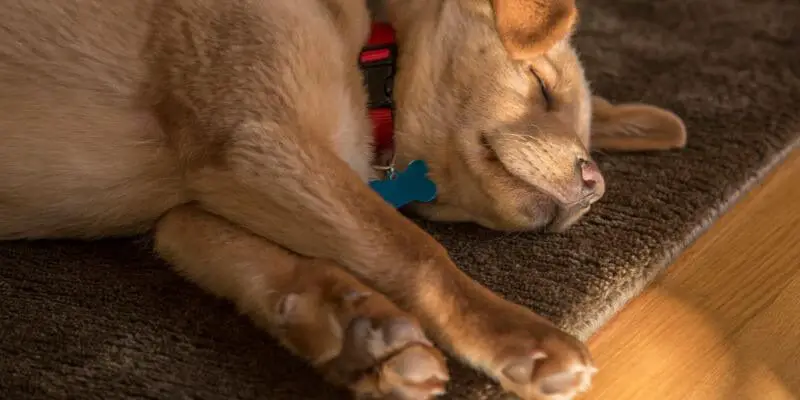
The first night
The first night is usually the most challenging for puppy owners. Being in an unfamiliar place without their mother and siblings is bound to be stressful for your new pup.
But, don’t worry, there are a few things you can do so both you and your puppy can have a good night’s sleep.
When it’s time for your puppy to go to sleep, make sure their bed is as comfortable as possible. Fill their crate with blankets, toys, and some puppy pads in case of any accidents.
You could also wrap a hot water bottle (make sure it isn’t too hot though!) in a towel. The heat will be reminiscent of the warmth of their mother.
If you can, take your puppy’s crate or pen to your bedroom. Your presence will help them feel a bit more reassured. Otherwise, put your pup’s bed in a room that’s quiet and warm.
Your puppy will most likely cry and whimper the first few nights, but you mustn’t comfort them or give them any attention. It’s tempting for some owners to let their puppy sleep in their bed. Doing so will only encourage them to make more noise. Make sure you only go over to your pup when they are quiet.
Set some alarms as your puppy will need to relieve themselves during the night. Even at 8 weeks old, puppies can only hold their bladder for around 2 hours.
Put your pooch on a leash when you take them outside, making sure they go straight back to bed once they’re done. This will help them get used to the nighttime routine.
Calming pre-bedtime puppy activities
As mentioned earlier, bedtime for your puppy should be as calm as possible, so make sure their last meal is at least an hour before they go to bed. You can also play relaxing music or keep the TV at the lowest volume.
Avoid playing with your puppy right before they’re due to sleep. Instead, cuddle up with your pooch or massage them to help them unwind. Don’t forget to take them outside to relieve themselves too.
How to stop puppy crying at night
While stopping your puppy from crying at night can take some time, there are a few things you can do to discourage the behavior, such as:
- Crate train your puppy
- Exercise and play with your puppy every day to tire them out
- Establish a routine and keep to it every day
- Check that your puppy doesn’t need something, such as the bathroom
- Keep distractions to a minimum
- Cuddle with your puppy before bed or engage in some calming pre-bedtime activities
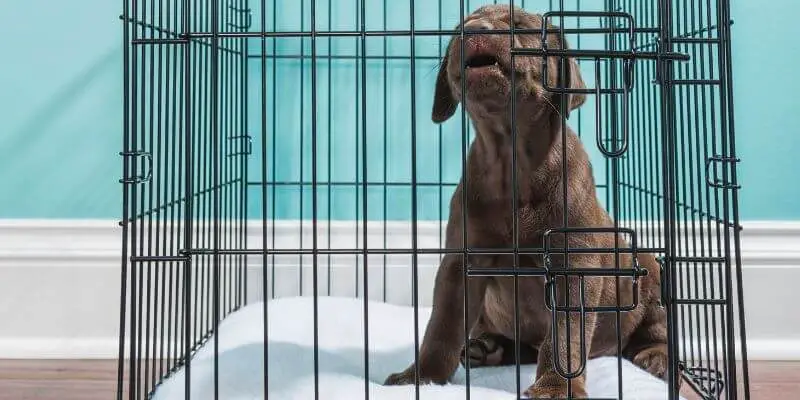
Getting your puppy used to being alone
Getting your puppy used to being alone at night can be a lengthy process, especially for the first couple of weeks. However, with time and patience, your companion should be able to sleep without the need to cry or bark!
Build time apart from your puppy gradually, making sure to offer them a tasty treat whenever they’ve successfully been alone without being noisy. Crate training your puppy will make things considerably easier, as will wearing out your puppy each day with exercise and fun activities.
For at least the first few nights your puppy is with you, consider letting them sleep in the same with you and put the crate close to your bed. They will be comforted by your presence and won’t feel as lonely.
Once your puppy has had time to settle in, you can then move their crate to a separate room.
Should I leave my puppy to cry at night?
Hearing your puppy cry at night can be concerning, and your natural instinct will probably be to check on them! This is actually the correct thing to do. You want to make sure your puppy isn’t crying because they need something or are unwell.
Besides, ignoring your puppy will only shake their confidence and may make the behavior worse.
Take your puppy outside as they may need the toilet, then calmly put them back inside the crate. You can reassure your puppy, but try to keep attention to a minimum. This will make them likely to associate crying or barking as a way to receive attention.
If your puppy continues to cry even after you’ve checked on them, then you’ll know they’re doing it because they want affection. At this point, it’s best to give them some time to settle, otherwise, they’ll learn that crying is an effective method for getting you to return!
How long should puppies sleep?
Puppies, especially those younger than 6 months of age, sleep for a considerable amount each day. Young dogs need lots of rest so they can grow up big and strong! Most puppies will happily sleep for between 18 to 20 hours a day.
Once a puppy reaches their half birthday, they will typically sleep for around 16 hours a day. Adult dogs, on the other hand, nap anywhere from 8 to 13.5 hours a day.
Final thoughts
Teaching your puppy to sleep through the night can be hard work, but it’s important to keep at it. A crate will make your job a lot simpler, so if you don’t own one already, be sure to add it to your shopping list!
Minimizing distractions and doing pre-bedtime calming activities can help you relax your pooch so they’re more likely to sleep at night. You can also make sure you wear your puppy out during the day so they’re too tired to be naughty in the evening!
References
- https://www.pdsa.org.uk/pet-help-and-advice/looking-after-your-pet/puppies-dogs/first-day-and-night-with-puppy#:~:text=If%20your%20puppy%20is%20worried,cause%20a%20lot%20more%20stress.
- https://www.rd.com/article/dog-sleep-in-bed/#:~:text=Unfortunately%2C%20puppies%20really%20shouldn’t,is%20key%20to%20potting%20training.
- https://be.chewy.com/how-to-teach-your-puppy-to-sleep-through-the-night/
- https://www.preventivevet.com/dogs/how-to-help-puppy-sleep-through-the-night
- https://ourfamilydog.org.uk/your-new-dog/dog-puppy-guides/how-to-get-puppies-to-sleep
- https://www.pdsa.org.uk/what-we-do/blog/vet-qa-why-do-puppies-cry-at-night

Written by: Joshua Gordon
Head of Research and Editorial, Joshua has over 7 years of experience as a finance and automotive research consultant. He is a childhood pet owner and dog enthusiast.








